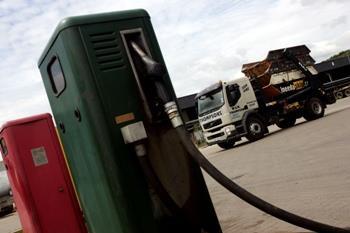
The Chancellor turned his back on the road transport industry in the Budget, announcing August's 3.02ppl increase in fuel duty will stay. MT takes a look at the economic case against this decision.
The price of bulk diesel has climbed 18.9% in the past 18 months, to reach a record high of 117ppl. Meanwhile, companies have continued to go to the wall, with Hull-based AR Lunn the latest failure. Predictably, rising fuel costs were a main reason why 115 employees lost their jobs.
The Freight Transport Association says that the Chancellor of the Exchequer’s failure to cut fuel duty rates has condemned UK industry to suffer the consequences of even higher fuel bills and operational costs at a time when the world price of oil stands at a four year high, with every prospect of further price rises in the coming months.
RHA chief executive Geoff Dunning says: “The Chancellor’s decision to go ahead with this rise is not only disappointing, the reason behind it is hard to understand.
“In the last Budget, the Chancellor seemingly understood the need to stop driving up fuel taxes and he actually cut duty. This time, he seems to have done a complete U-turn. We are struggling to achieve any growth and pump prices have reached record highs – yet he is driving fuel costs even higher.
“Diesel fuel is now the most expensive it has ever been - the RHA’s weekly fuel price survey last week hit an all-time record high – and yet the Chancellor will be driving costs up by another £1,200 a year for a large truck – costs that hauliers must now set about trying to recover from their hard-pressed customers.”
In the run up to the Budget, campaign group FairFuelUK (FFUK) had been pursuing a new tactic.
Recognising that it is all about the numbers for the Chancellor, FFUK commissioned a study by the respected Centre for Economics and Business Research (CEBR). The study is a comprehensive document examining the effect on the UK economy of a reduction in fuel duty.
Importantly it’s written in language the Treasury understands, and is a way to sidestep George Osborne’s mantra of controlling the UK’s structural deficit at any cost.
As Jon Tobbell, commercial director at Hermes, points out, the firm is “spending more than £12m a year on fuel. It’s impossible for us to try to absorb the additional overheads”.
A change in approach
“We’re trying to affect a sea change in thinking, "FFUK’s head Peter Carroll said earlier this month, adding: “I’m never intimidated by the odds.”
That’s good, as although the argument for a cut in duty is persuasive, it will take huge effort to shift the Treasury’s “tax’em” mindset. Given the announcement in the Budget, it's also now become a long game.
However, using a model drawing on data collected by the Office for National Statistics, CEBR’s report attempts just that. It makes the case that a reduction in fuel duty would, in fact, boost the government’s coffers, due to the stimulus provided to the economy.
According to the analysis, a 1ppl reduction in fuel duty would increase GDP by 0.35% and a 2.5ppl cut by 0.32% (the bigger the reduction the smaller the GDP boost, due to the loss of direct tax revenue). Even a 5ppl reduction in fuel duty still yields a 0.28% increase in GDP.
This is only one part of a bigger picture. The boost to GDP may well tail off as larger reductions in fuel duty are factored in. But it is the opposite with GVA (gross value added). The larger the reduction, the greater the increase in GVA. For example, a 2ppl reduction in fuel duty means a 0.47% increase in GVA and 5ppl a 0.56% boost. The measure, which records the value of goods in a sector, is a truer measure of the positive impact on economic activity of cutting duty. Back in the real world, that means jobs.
With unemployment at 2.67 million in the UK, another key finding is the potential to create jobs. A 1ppl cut in fuel duty would generate 161,000 new jobs in the following year; a 2.5ppl cut 175,000 jobs; and the 5ppl option 208,000 jobs.
Economic activity
Up to 2.5ppl, the impact on our cash-strapped government’s fiscal position is neutral, as the cut in direct tax take is completely off-set by the income from greater economic activity.
A 5ppl reduction would cost the Exchequer £1.2bn in the first year, falling to an annual bill of £1bn thereafter. This is the same amount it has recently fronted for its NewBuy mortgage scheme.
The CEBR report puts it another way, stating: “These are not insignificant impacts in the current climate of less than 1% annual growth. But this is not to mention the intangible benefits that could flow from the morale boost provided to consumers by helping alleviate the squeeze on their disposable incomes.”
FFUK spokesman Quentin Willson adds: “The report gives economic rigour to what our supporters have known for months. Cutting fuel duty will boost growth, create jobs, and reduce welfare bills.”
It sounds like a fair outcome for the industry and a coalition government in need of a popularity boost. But the road transport industry realised long ago, confirmed in the Budget, that when it comes to fuel duty life is not always fair.














